
In a landmark achievement for maritime navigation and surveillance, the Royal Navy, in collaboration with UK-based quantum technology firm Aquark Technologies, has successfully tested advanced quantum sensing capabilities at sea. This operation, conducted aboard the HMS Pursuer, underscores a significant step forward in the application of quantum technologies for military use, particularly in enhancing position, navigation, and timing (PNT) systems independent of GPS.
Quantum Leap in Naval Technology
Aquark Technologies, known for their pioneering work in cold atom technology, demonstrated their innovative quantum sensing equipment under challenging maritime conditions. The trial aimed to prove the robustness and real-world applicability of their technology, which could potentially revolutionize how naval forces track, navigate, and secure operations around the world.
- Trial Details: The test involved deploying Aquark’s cold atom technology on the HMS Pursuer, a vessel equipped for such advanced experiments. The system was put through a series of realistic scenarios, including various maneuvers and environmental conditions, to test its limits and reliability.
- Operational Advantages: The successful trial highlighted the potential of quantum sensing to provide precise navigation and detection capabilities. Unlike traditional GPS, which relies on satellite signals and can be compromised by jamming or spoofing, quantum sensing uses fundamental quantum properties to measure position and movement with high accuracy, offering a secure alternative.
Strategic Significance
This technological breakthrough is not just a matter of scientific interest but carries significant strategic implications:
- Autonomy from GPS: With nations increasingly developing capabilities to interfere with GPS signals, a quantum-based navigation system could ensure the Royal Navy maintains operational effectiveness in contested environments.
- Submarine Detection: Quantum sensors could enhance the detection of submarines by sensing minute gravitational changes or magnetic anomalies that traditional sonar might miss, thereby bolstering anti-submarine warfare capabilities.
- Future Naval Operations: The Royal Navy’s commitment to quantum technology aligns with global trends where quantum applications are seen as future-proofing national defense strategies against emerging threats.
Quotes and Insights
Andrei Dragomir, Co-Founder and CEO of Aquark Technologies, expressed enthusiasm about the trial’s outcome: “Our technology has now been validated in one of the most challenging environments possible – the open sea. This isn’t just about navigation; it’s about setting a new standard for how we perceive and interact with our environment in military contexts.”
A spokesperson from the Royal Navy added, “This successful test is a testament to our commitment to staying at the forefront of technological innovation. Quantum technology offers us not just an edge in navigation but also in various other applications critical to our operations.”
Looking Ahead
The Royal Navy plans to further integrate quantum technologies into its fleet over the next few years, with this test marking the beginning of a series of trials and potential deployments. Aquark Technologies, bolstered by recent seed funding from NATO and other defense investors, aims to refine their systems for broader applications, potentially including civilian uses for navigation in areas without reliable GPS coverage.
This collaboration between the Royal Navy and Aquark Technologies represents a pivotal moment in the integration of quantum physics into practical military applications, promising a future where quantum sensing could become as commonplace as sonar or radar in naval operations.




